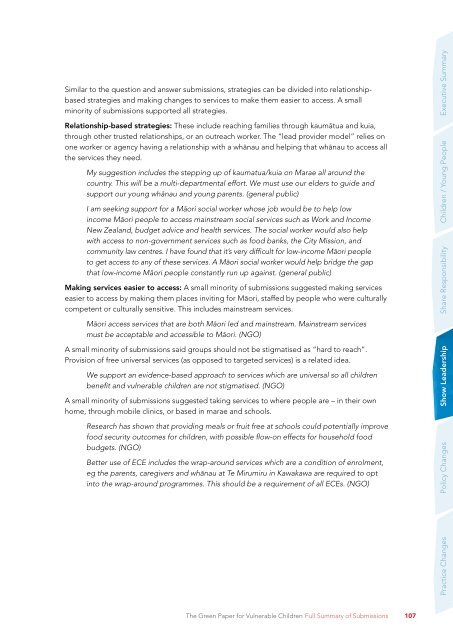The Green Paper for Vulnerable Children - Ministry of Social ...
The Green Paper for Vulnerable Children - Ministry of Social ...
The Green Paper for Vulnerable Children - Ministry of Social ...
Create successful ePaper yourself
Turn your PDF publications into a flip-book with our unique Google optimized e-Paper software.
Similar to the question and answer submissions, strategies can be divided into relationshipbasedstrategies and making changes to services to make them easier to access. A smallminority <strong>of</strong> submissions supported all strategies.Relationship-based strategies: <strong>The</strong>se include reaching families through kaumātua and kuia,through other trusted relationships, or an outreach worker. <strong>The</strong> “lead provider model” relies onone worker or agency having a relationship with a whānau and helping that whānau to access allthe services they need.My suggestion includes the stepping up <strong>of</strong> kaumatua/kuia on Marae all around thecountry. This will be a multi-departmental ef<strong>for</strong>t. We must use our elders to guide andsupport our young whānau and young parents. (general public)I am seeking support <strong>for</strong> a Māori social worker whose job would be to help lowincome Māori people to access mainstream social services such as Work and IncomeNew Zealand, budget advice and health services. <strong>The</strong> social worker would also helpwith access to non-government services such as food banks, the City Mission, andcommunity law centres. I have found that it’s very difficult <strong>for</strong> low-income Māori peopleto get access to any <strong>of</strong> these services. A Māori social worker would help bridge the gapthat low-income Māori people constantly run up against. (general public)Making services easier to access: A small minority <strong>of</strong> submissions suggested making serviceseasier to access by making them places inviting <strong>for</strong> Māori, staffed by people who were culturallycompetent or culturally sensitive. This includes mainstream services.Māori access services that are both Māori led and mainstream. Mainstream servicesmust be acceptable and accessible to Māori. (NGO)A small minority <strong>of</strong> submissions said groups should not be stigmatised as “hard to reach”.Provision <strong>of</strong> free universal services (as opposed to targeted services) is a related idea.We support an evidence-based approach to services which are universal so all childrenbenefit and vulnerable children are not stigmatised. (NGO)A small minority <strong>of</strong> submissions suggested taking services to where people are – in their ownhome, through mobile clinics, or based in marae and schools.Research has shown that providing meals or fruit free at schools could potentially improvefood security outcomes <strong>for</strong> children, with possible flow-on effects <strong>for</strong> household foodbudgets. (NGO)Better use <strong>of</strong> ECE includes the wrap-around services which are a condition <strong>of</strong> enrolment,eg the parents, caregivers and whānau at Te Mirumiru in Kawakawa are required to optinto the wrap-around programmes. This should be a requirement <strong>of</strong> all ECEs. (NGO)Practice Changes Policy Changes Show Leadership Share Responsibility <strong>Children</strong> / Young People Executive Summary<strong>The</strong> <strong>Green</strong> <strong>Paper</strong> <strong>for</strong> <strong>Vulnerable</strong> <strong>Children</strong> Full Summary <strong>of</strong> Submissions107
















